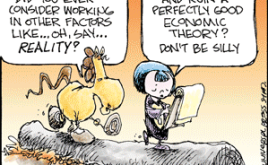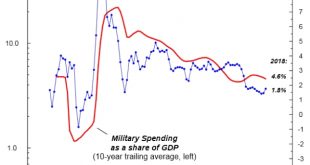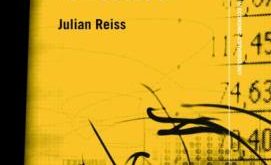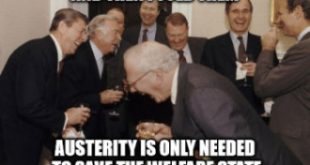from Peter Radford I am not quite sure what to make of the phrase “radical uncertainty”. It pops up in most discussions of Keynes as being a critical, if not the critical, point of departure of his thinking from the silliness we know as classical economics. Is radical uncertainty a redundant statement? If something is uncertain, what is it that can make it radically so? Surely the whole point of uncertainty is that we have no idea just how radical that lack of knowledge may be. Worse,...
Read More »How to make economics a relevant science again
from Lars Syll Economists are struggling to explain recent productivity developments, the implications of rising inequality, the impact of persistently negative interest rates in the eurozone … and the sudden slowdown in European growth … None of this is a huge surprise, given the profession’s embrace of simplistic theoretical assumptions and excessive reliance on mathematical techniques that prize elegance over real-world applicability … All of this should tell economists that there is...
Read More »Adam Smith’s bad history leads to bad economics
from Asad Zaman Guest Post by Donni Wang [author details at bottom of post]. Republished from The Economic Historian blog: “No Go from the Get Go: Adam Smith’s Bad History, Lessons from Ancient Greece, and the Need to Subsume Economics” – She is a historian, and argues here that a false history which portrays progression and progress actually seals off alternatives and choices which we could, and indeed need to, make today. Correcting Adam Smith’s views about history of mankind, using...
Read More »Wars have become too cheap to boost growth
from Shimshon Bichler and Jonathan Nitzan This week, with the Federal Reserve Banks of New York and Atlanta anticipating sharply lower GDP growth for 2019:Q1, President Trump presented a ‘Budget for A Better America’, calling for a smaller government and a bigger military. Forty years ago, the very same call was hailed as the best recipe for renewed growth. The U.S. ruling class was getting ready to install Ronald Reagan as President, abandon the Cold War and embark on neoliberalism,...
Read More »Your model is consistent? So what?
from Lars Syll In the realm of science it ought to be considered of little or no value to simply make claims about the model and lose sight of reality. There is a difference between having evidence for some hypothesis and having evidence for the hypothesis relevant for a given purpose. The difference is important because scientific methods tend to be good at addressing hypotheses of a certain kind and not others: scientific methods come with particular applications built into them … The...
Read More »Open thread March 14, 2019
% of children living in relative poverty – 36 countries
A new mode of production?
from Donald Gillies If a new mode of production is really going to supersede capitalism, then it is likely that we can find examples of this way of producing already coming into existence, though perhaps not yet in fully developed form. Paul Mason draws attention to a striking example, namely Wikipedia. This is what he says (p. 128): “Wikipedia is the best example. Founded in 2001, the collaboratively written encyclopaedia has, at the time of writing, 26 million pages and 24 million...
Read More »Brad DeLong admits neoliberal era has come to an end
from Lars Syll Should Democrats lean away from market-friendly stances and get comfortable with big government again? Should they embrace an ambitious 2020 candidate like Sanders and policies like the Green New Deal, or stick with incrementalists like former Vice President Joe Biden and more market-oriented ideas like Obamacare? One of the most interesting takes I’ve seen on this debate came from Brad DeLong, an economist at the University of California-Berkeley … one of the...
Read More »Econometric beasts of bias
from Lars Syll In an article posted earlier on this blog — What are the key assumptions of linear regression models? — yours truly tried to argue that since econometrics doesn’t content itself with only making ‘optimal’ predictions,” but also aspires to explain things in terms of causes and effects, econometricians need loads of assumptions — and that most important of these are additivity and linearity. Let me take the opportunity to elaborate a little more on why I find these...
Read More » Heterodox
Heterodox






